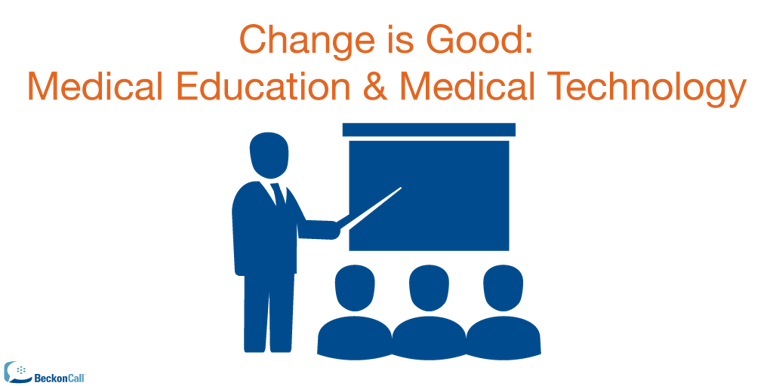 Posted by Dr. Becker on Feb 14, 2017 11:03:45 AM
Posted by Dr. Becker on Feb 14, 2017 11:03:45 AM

Start ‘em young, they say. Who is “they?” Anyone with an opinion. What are we starting ‘em on? Anything “they” happen to have an opinion about: Violin lessons, golf, holding the door open for their elders…
In this case, we at BeckonCall are talking about starting young physicians working with good healthcare IT during their training. From a utilization standpoint, IT and communications tools should be approached much the same way as diagnostics, implants and drugs. Namely, if a new tool is evidence-based, useful to a clinician’s practice, and financially beneficial, it should be considered for use. Like a new therapeutic intervention, this doesn’t mean that medical practices should automatically switch to the latest and greatest. But clinicians should have access to select, cutting edge products that will help them advance their nascent practices and medicine in general.
There are two significant challenges when thinking about adopting new technology and/or training the next generation in it:
First, is newer really better? We hear so much about the latest, most innovative, revolutionary, game-changing gewgaw that it’s easy to become inured to the hype. (No, but really, this one IS innovatively game-changing!) That’s a good thing, at least to an extent. Of course we should demand evidence that something will in fact make some process better. And in some cases, the latest thing doesn’t create improvements, or the different isn’t worth the cost. In medicine, there are tried and true methods for many things that haven’t changed much in decades. Fine. Leave them be…at least until something that is actually better comes along. Why waste our residents’ time and mental energy on cool stuff that doesn’t make their patients’ lives better?
The second thing is somewhat opposite of the above. Some tools, particularly digital, are on their way to obsolescence the day they are released. This is especially true for consumer software and computer hardware. As a result, it can be overwhelming to consider changing from old to new, because we all know there will be another model showing up next year. It’s not as extreme in clinical practice, where large pieces of equipment are long-term investments with minimal changes year to year (or longer). In the office, though, it can be far easier just to leave that old computer in place, and continue using the fax machine.
In some ways, that second issue makes it all the more important for new clinicians to be trained on the latest technology. New physicians are likely already using the latest consumer technology, so they should have exposure (at a minimum) and access (ideally) to the equivalent in their careers. A review from 2014 found that 80% of MDs and medical trainees used a smartphone, “and this percentage is expected to increase.” We now see people entering the medical workforce who were born in the ‘90s and therefore raised with tools such as email, web browsing, social media and touch screens, rather than having to adopt it later in life. Their expectations for the tools available in their practices will reflect this upbringing. Additionally, even newer tools are coming online at an increasing pace to keep up with other changes in the healthcare landscape: genomics and big data, regulatory concerns, reimbursement and value-based care issues, faster communications networks, etc.
Unfortunately, medical education has been sclerotic for decades: A recent report from Deloitte puts it at a century. This is certainly not because there haven’t been improvements to be made. As the report points out and we noted above, there is significant change happening at an ever increasing rate across multiple sectors and disciplines. These changes are “demanding new competencies” from new physicians. The report goes into detail about an array of needed changes to the education system, but one key point is better integration of new technology. It can start small, “as simple as allowing the use of tablet technology in the classroom setting or using advanced imaging tools during anatomy courses.”
Looking at mobile technology specifically, the 2014 review indicated a number of benefits to using smartphones. These include improvements in knowledge and better patient management as a result of text messaging, along with reference materials such as anatomy apps. Thus, education itself may benefit from better integration of technology.
On the other side of graduation, in clinical practice, the benefits of mobile technology are well known. Text messaging or similar interventions can improve patient outcomes, increase compliance and streamline patient teaching.
In addition, there is the benefit felt by everyone across all industries in the form of Moore’s Law. The actual “law” states that the number of transistors per unit area will double every 18 months (every year, originally). However, the general concept behind Moore’s observation is simply that technology gets faster and cheaper at regular intervals, leading to exponential gains in performance. For example, the iPhone 7 is estimated (by Apple, to be fair) to be 50% faster than its immediate predecessor, and perhaps as much as 120x faster than the original 2007 model.
Put those things together, and project out into the near future, and we have a scenario where our physicians will be using increasingly sophisticated technology to perform increasingly complex tasks with greater accuracy and at lower cost. Everyone in the healthcare vertical will benefit: faster diagnoses and more specific treatments for patients, more efficient workflows and data entries and decision-making for physicians, and massive cost savings for payers and hospital systems.
It is therefore critical to ensure the next generation of MDs is well-prepared to take advantage of these trends as they enter the workforce so as not to be playing catchup later. Medical educations need to be (and are, which we’re glad to see) evaluating their programs and looking for signs of technological sclerosis.
The business community has a responsibility, as well. We are developing products and trying to sell them, but we need to be giving away ideas that can help drive healthcare forward, as well. BeckonCall wants to be part of the solution while also building a successful business. Therefore, we are currently offering BeckonCall free to residency programs. We obviously have something to gain from this in the long run, but we truly believe that our product can be - will be - a valuable tool to physicians and their teams moving forward. Because of that, we’re happy to give the new generation of MDs a chance to try it out and get comfortable, evaluating the product while hopefully finding real efficiency gains from it.
If you’re interested in learning more about this program, contact us today.
Topics: Practice Profitability